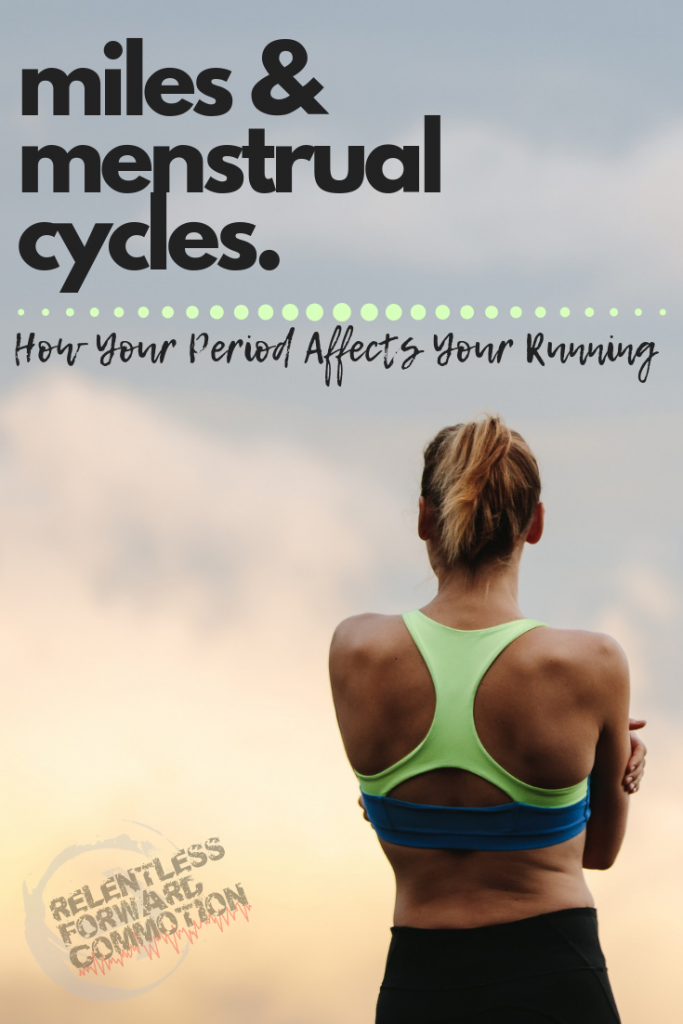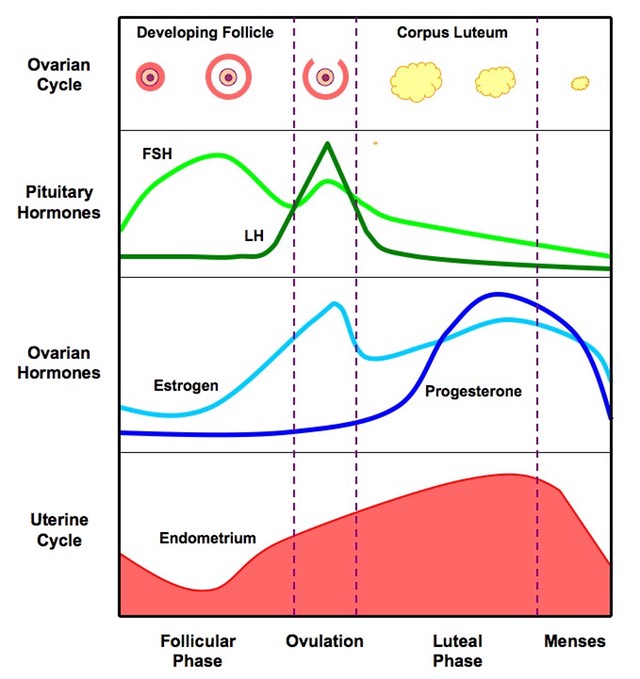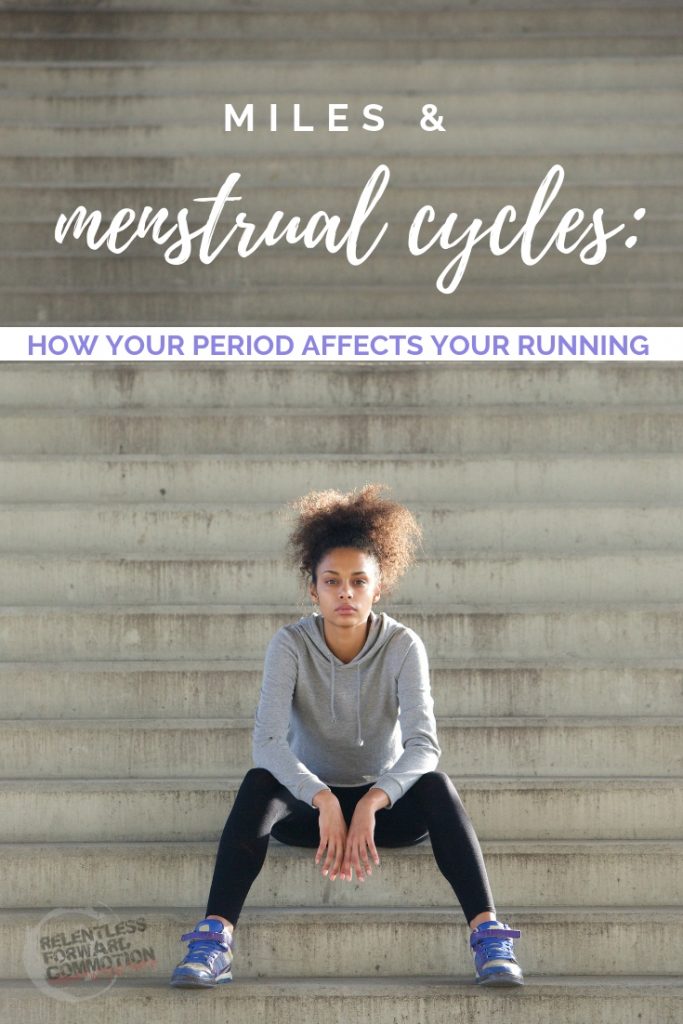Last Updated on September 15, 2018 by Heather Hart, ACSM EP, CSCS
As a female runner, there are a few circumstances and considerations we have to take that our male counterparts do not. Like, finding a sports bra that actually works. Running while pregnant, post-partum, or breastfeeding. Or the topic of todays post: how your period affects your running and training.
This is the point in this post where many would “warn” their male readers to tune back in another day, but I’m not going to do that. I think that menstrual cycles have become such a taboo topic in our society, when they are as natural as eating, sleeping, and breathing. It’s part of life. So men, I encourage you to keep reading for a quick science lesson, particularly if you have a female runner in your life. It’s a quick, simple, non graphic read.

Female runners do not like to use our anatomical differences as an excuse to slow down our training. That said: menstrual cycles can often be downright uncomfortable, leaving women in not only discomfort, but sometimes a lot of physical pain, especially towards the beginning of their cycle. On those days it would be easy to justify skipping a training running for curling up on the couch in a pair of baggy sweatpants, blaming our period for what we can only assume would end up being a less than stellar run.
But how do our periods really affect our running?
First, let’s have a little refresher on the menstrual cycle as a whole.
The first day of the cycle is the first day of menses, or when bleeding begins. Bleeding is usually complete by day 5 or 7. Days 1-14 are called the follicular phase. By day 14 or 15, ovulation begins with a surge in estrogen and luteinizing hormone. The following phase lasts until the last day (28 on average) and is called the luteal phase.
During the luteal phase, or the weeks leading up to your period, the hormones estrogen and progesterone are at their highest. The change in hormone levels cause a number of changes in your body, including (but not limited to) decreased sodium levels, a drop in blood plasma volume, and an increase in core temperature.

I know what you’re thinking right now:
“Heather, enough with the science. Tell me HOW my period affects my running.”
It may surprise you to know that the hormone levels before you get your period are more likely to negatively affect your performance than the hormone levels after the first day of your menses. A decrease in blood plasma volume means your blood will essentially be thicker, and therefore slower moving to the muscles both during exercise and recovery. As we know, blood carries oxygen to the muscles to aid in performance during exercise and to stimulate healing of damaged tissue during recovery. Further, a decrease in blood plasma volume can slow down our body’s natural sweat response, which will cause an increase in core body temperature, negatively affecting performance.
Once your period starts, specifically on the second day of bleeding, your estrogen and progesterone levels hit rock bottom. In other words, even though you may feel miserable, your hormone levels and core temperature are more similar to that of a male at this point than at any other point of the month. Pretty ironic, isn’t it? From a performance standpoint, this means you are physiologically more likely to hit higher intensities with your workouts.
In short: the few days BEFORE your period: decreased performance.
As soon as your period starts, and few days after: increased performance.

Further, running can help you get rid of uncomfortable and painful menstrual cramps. The increased blood flow from aerobic exercise produces natural pain relieving endorphins, and helps to burn the prostaglandins, or chemicals that cause muscle contractions, which result in cramps. And those endorphins do more than just relieve physical pain: these mood affecting neurotransmitters have been proven to help uplift your mood and decrease stress.
Related: The Runner’s High – What Is It and How Can I Get One?
So, how does your period affect your running? In short, it doesn’t, at least not negatively on a physiological level. Training is more likely to be inhibited during the week before your period starts. As if PMS wasn’t bad enough as it is.
In short: don’t let your period inhibit your training, if you can help it. Sure, you may feel crampy, moody, and uncomfortable, but from a training point of view you may be at your peak while on your menstrual cycle. And getting out there to run just might make you feel better.
Heather Hart is an ACSM certified Exercise Physiologist, NSCA Certified Strength and Conditioning Specialist (CSCS), UESCA certified Ultrarunning Coach, RRCA certified Running Coach, co-founder of Hart Strength and Endurance Coaching, and creator of this site, Relentless Forward Commotion. She is a mom of two teen boys, and has been running and racing distances of 5K to 100+ miles for over a decade. Heather has been writing and encouraging others to find a love for fitness and movement since 2009.

Organic Runner Mom
Love this article! It is super informative for all women who run! Thanks Heather!
Virjinia
I like to stay active whenever I’m on my period. I haven’t taken notes to see how it affects my performance but I’ve read a few other posts on the subject to realize that it truly does have some sort of impact on our bodies. It’s absolutely wild how everything works so I’m not surprised!
ali lopez
interesting read! but i am lucky/unlucky enough to be in menopause. wondering how that affects running….
Madelyn
Using a menstrual cup has 100% changed running while on totm. Would recommend to any runner out there!
Jo Byrne
How you describe the effects is exactly as they happen for me. The week before my period, I have a real dip in energy, often feel light headed and run performance is affected.
During this period I tend to stick to shorter, less intense runs.
Great insight though, thanks for posting.
Molly
I am 15 years old and still haven’t had my period. As a runner who trains 6 times a week, should I be worried? All my friends have it and I don’t feel normal.